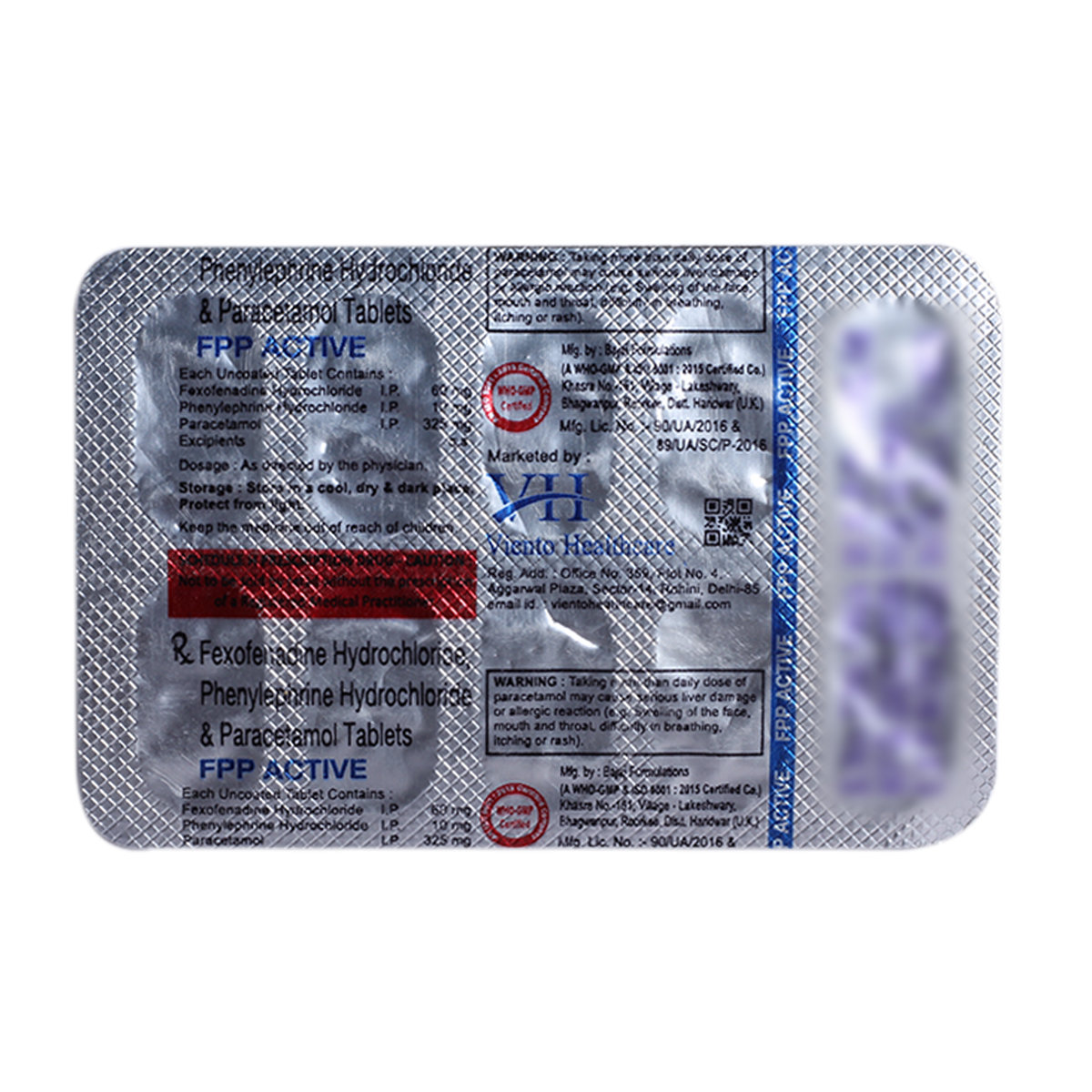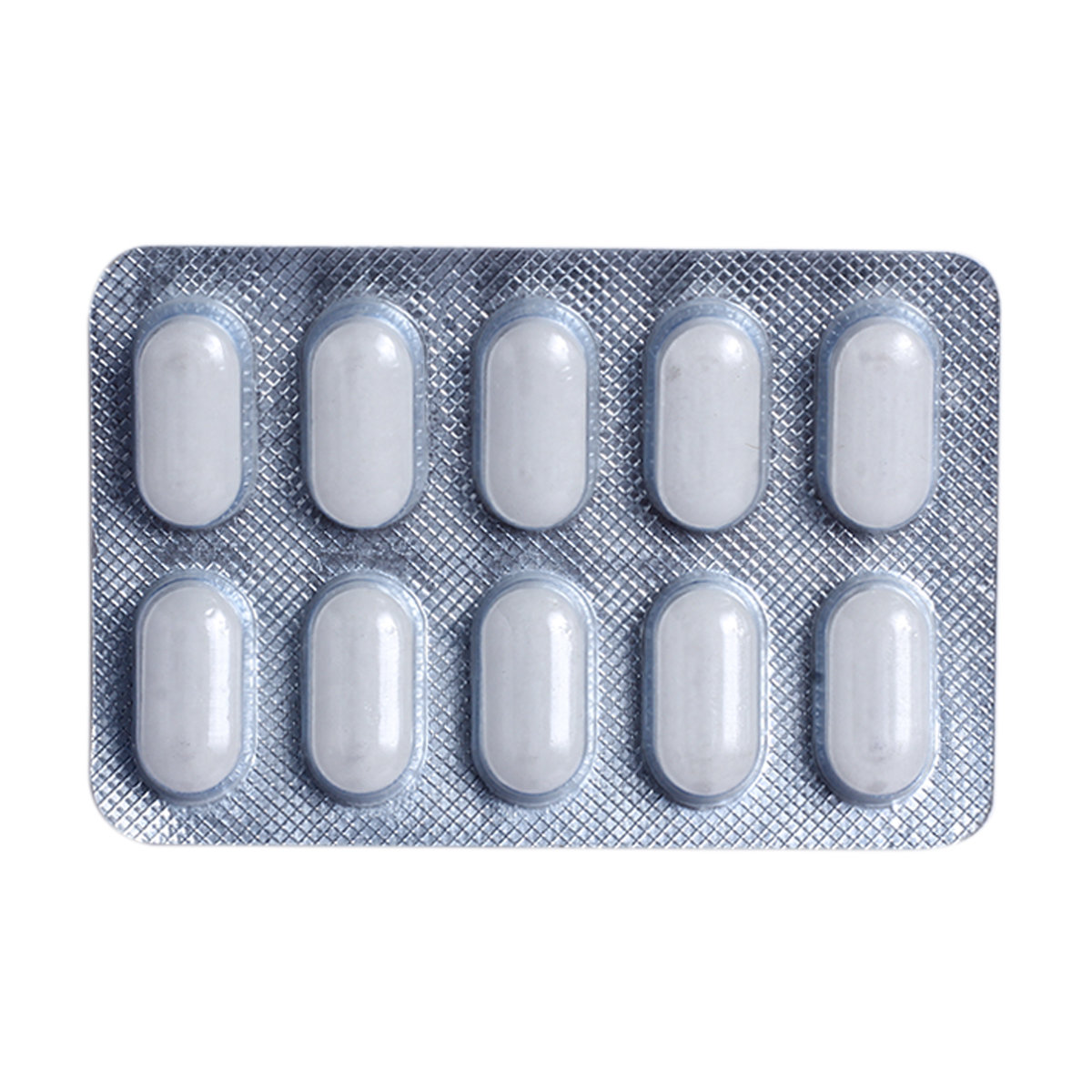Fpp Active Tablet 10's
MRP ₹164
(Inclusive of all Taxes)
₹24.6 Cashback (15%)
Provide Delivery Location
Online payment accepted
 Prescription drug
Prescription drugWhats That
Manufacturer/Marketer :
Consume Type :
Expires on or after :
Return Policy :
About Fpp Active Tablet
Fpp Active Tablet belongs to the class of medications called ‘cough and cold preparations’ used in the treatment of the common cold and allergic symptoms such as the runny nose, sneezing, itchy or watery eyes and blocked nose. The common cold is a respiratory illness of the nose and throat caused by ‘rhinoviruses’. Allergies are immune system reactions to foreign bodies or allergens such as certain foods, chemicals, pet dander, or pollen.
Fpp Active Tablet contains Fexofenadine, Paracetamol, and Phenylephrine. Fexofenadine is an antiallergic medicine. It blocks the release of histamine, chemical substances that cause allergic symptoms such as the runny nose, watery eyes, itching, sneezing, and swelling or congestion. Paracetamol is an analgesic (reduce pain) and antipyretic (reduce fever). It can block the production of prostaglandins (chemical substances), thereby decreasing pain, swelling, and inflammation. Phenylephrine is a decongestant that can reduce swelling in the nasal passages making it easy to breathe.
You should take this medicine exactly as prescribed by the doctor. The common side-effects of Fpp Active Tablet are nausea, vomiting, headache, ear pain, trouble sleeping, restlessness, and palpitations (pounding heart). These side-effects usually go away without requiring any medical attention. However, if any of these side-effects persist or get worse, inform your doctor immediately.
It is not recommended to take Fpp Active Tablet if you are allergic to any contents of it. It should not be used in patients with severe liver failure. It should be used with caution in children, patients with liver or kidney disease, pregnant women, breastfeeding mothers, and elderly people. Alcohol increases the risk of side-effects. Fpp Active Tablet may decrease alertness, so do not drive or operate heavy machinery if you are not fully alert.
Uses of Fpp Active Tablet
Directions for Use
Key Benefits
Fpp Active Tablet is composed of three medicines, namely Fexofenadine, Paracetamol, and Phenylephrine. Fexofenadine is an anti-allergic drug that works by blocking the action of histamine, a substance responsible for causing allergic reactions. It helps relieve allergy symptoms such as sneezing, running nose, watery eyes, itching, swelling, congestion or stiffness. Paracetamol is an analgesic (relieves pain) and antipyretic (reduces fever) that works by inhibiting the production of certain chemical messengers in the brain known as 'prostaglandin's responsible for pain and fever. Phenylephrine helps in shrinking the blood vessels in the nostrils and the nasal passage and reducing stuffy nose. Together, Fpp Active Tablet can effectively treat common cold and allergy symptoms.
Storage
Drug Warnings
Do not take Fpp Active Tablet if you have been taking medicines to treat depression (monoamine oxidase inhibitors) such as selegiline and rasagiline in the past 14 days. Before taking Fpp Active Tablet , inform your doctor if you have any liver or kidney disease, diabetes, hyperactive thyroid, heart problems, fits, and glaucoma (increased pressure in the eye). Fpp Active Tablet may cause liver damage on prolonged use or when used in high doses, so it is not recommended for use in patients with severe liver failure.
Drug-Drug Interactions
Drug-Drug Interactions
Login/Sign Up
Taking Fpp Active Tablet with Propofol may lead to increased levels of Fpp Active Tablet leading to side effects like high blood pressure.
How to manage the interaction:
Taking Fpp Active Tablet with Propofol is not recommended, but it can be taken if prescribed by the doctor. Do not discontinue the medications without consulting a doctor.
Taking Furazolidone with Fpp Active Tablet can cause an increase in high blood pressure.
How to manage the interaction:
Taking Furazolidone with Fpp Active Tablet is not recommended, it can be taken if prescribed by the doctor. However, if you experience sudden and severe headache, blurred vision, confusion, seizures, chest pain, nausea or vomiting, sweating, lightheadedness, fainting, sudden numbness or weakness (especially on one side of the body), speech difficulties, fever, consult the doctor immediately. It is advised to use Fpp Active Tablet only after 14 days of stopping Furazolidone.
Co-administration of Fpp Active Tablet with Sevoflurane can increase the levels of Fpp Active Tablet and lead to side effects.
How to manage the interaction:
Taking Fpp Active Tablet with Sevoflurane is not recommended, it can be taken if prescribed by the doctor. Do not discontinue the medications without consulting a doctor.
Taking Tranylcypromine with Fpp Active Tablet can increase the risk of high blood pressure.
How to manage the interaction:
Taking Tranylcypromine with Fpp Active Tablet is not recommended, but can be taken together if prescribed by a doctor. However, consult a doctor if you experience severe headache, blurred vision, confusion, seizures, chest pain, nausea or vomiting, sudden numbness or weakness (especially on one side of the body), speech difficulties, fever, sweating, lightheadedness, and fainting Do not discontinue any medications without consulting a doctor.
Co-administration of Selegiline with Fpp Active Tablet together can raise blood pressure.
How to manage the interaction:
Taking Selegiline with Fpp Active Tablet is not recommended, it can be taken together if prescribed by a doctor. However, consult a doctor immediately if you experience any symptoms such as severe headache, blurred vision, confusion, fits, chest pain, nausea or vomiting, sudden numbness or weakness (especially on one side of the body), speech difficulties, fever, sweating, lightheadedness, and/or fainting Do not discontinue any medications without consulting a doctor.
Fpp Active Tablet can considerably increase blood levels of bosutinib. This may exacerbate the adverse effects of bosutinib.
How to manage the interaction:
Although there is a possible interaction between Bosutinib and Fpp Active Tablet, you can take these medicines together if prescribed by your doctor. Do not discontinue any medications without consulting your doctor.
When Fpp Active Tablet and Eluxadoline are taken together, increase levels of Fpp Active Tablet by decreasing metabolism.
How to manage the interaction:
Taking Fpp Active Tablet with Eluxadoline together can possibly result in an interaction, but it can be taken if a doctor has advised it. If you notice any symptoms related to your condition, it's important to contact a doctor right away. Do not stop using any medications without talking to a doctor.
Co-administration of Fpp Active Tablet may decrease the excretion rate of Oxazepam which could result in a higher serum level.
How to manage the interaction:
Although there is a possible interaction between Oxazepam and Fpp Active Tablet, you can take these medicines together if prescribed by a doctor. Do not stop using any medications without a doctor's advice.
Co-administration of ketamine and Fpp Active Tablet may decrease the effectiveness of Ketamine which could result in a higher blood level.
How to manage the interaction:
Although taking Ketamine and Fpp Active Tablet together can evidently cause an interaction, it can be taken if a doctor has suggested it. If you're feeling very sleepy or having trouble breathing, it's important to contact your doctor right away. Do not stop using any medications without a doctor's advice.
Co-administration of Teriflunomide with Fpp Active Tablet may increase the risk or severity of Liver problems.
How to manage the interaction:
Taking Fpp Active Tablet with Teriflunomide together can possibly result in an interaction, but it can be taken if a doctor has advised it. Do not discontinue any medications without consulting a doctor.
Drug-Food Interactions
Drug-Food Interactions
Login/Sign Up
Diet & Lifestyle Advise
- Staying hydrated is vital for those with a cough or cold. Drinking liquids at room temperature can alleviate cough, runny nose, and sneezing.
- The immune system is affected by stress and raises the risk of being sick. An individual can exercise regularly, meditate, do deep breathing, and try progressive muscle relaxation techniques to relieve stress.
- To stay fit and safe, try to sleep at least 8 hours each night.
- It is advised to avoid contact with known allergens (allergy-causing agents) such as pollen, dust, etc. Certain food items are known to cause allergies to you.
- Maintain personal hygiene and keep your surroundings clean.
Side Effects of Fpp Active Tablet
- Nausea
- Vomiting
- Headache
- Ear pain
- Trouble sleeping
- Restlessness
- Palpitations (pounding heart)
Habit Forming
Therapeutic Class
All Substitutes & Brand Comparisons
RX
Out of StockFexocold Tablet 10's
LEGION PHARMA
₹75
(₹7.5 per unit)
49% CHEAPERRX
Out of StockCNF Activ Tablet 10's
Eris Life Sciences Ltd
₹126.5
(₹11.39 per unit)
22% CHEAPERRX
Out of StockFpp Active Tablet
Vestal Lifesciences Pvt Ltd
₹135
(₹12.15 per unit)
17% CHEAPER
Drug-Diseases Interactions
Drug-Diseases Interactions
Login/Sign Up
FAQs
Drug-Drug Interactions Checker List
- DOMPERIDONE
- METOCLOPRAMIDE
- PHENELZINE
- PROCARBAZINE
- RASAGILINE
- SELEGILINE
- TRANYLCYPROMINE
- IMIPRAMINE
- DESIPRAMINE
- WARFARIN
- CHOLESTYRAMINE
- ZIDOVUDINE
- CODEINE
- MORPHINE
- CHLORAMPHENICOL
- EPINEPHRINE
- FORMOTEROL
- MAGNESIUM HYDROXIDE
- ALUMINIUM HYDROXIDE
- METHYLDOPA
- RESERPINE
Special Advise
- If you are undergoing an allergy test, the doctor might advise you to stop Fpp Active Tablet 5 days before the test as this medicine may interfere with the test results.
- Check the labels carefully before taking any over-the-counter (OTC) medicines as many pain and cold medicines contain paracetamol as an ingredient.
Disease/Condition Glossary
Common cold: The common cold is an infection caused by the virus, mainly known as ‘rhinoviruses’ affecting the nose and throat (upper respiratory tract). Children younger than 6 years are at the most significant risk of colds, but healthy adults can also be affected to have 2-3 colds annually. In most cases, cold symptoms are recovered within a week or ten days. However, symptoms might last longer in people who smoke or are exposed to allergens like pollutants, dust, etc. The common cold symptoms include sneezing, sore throat, cough, congestion, mild body pains, low fever, mild headache, feeling unwell, stuffy, or runny nose. In some cases, the discharge from the nose may become thicker and yellow or green, which is not an indication of bacterial infection.
Allergies: It occurs when foreign elements that cause allergy (allergens) attack and invade our body, causing the release of histamines. This chemical messenger 'histamines' causes swelling, inflammation, redness, itchiness, itchy/watery nose, throat, and watery eyes. Allergies generally occur due to chemicals, air pollution, pet danders, dust, pollen hairs, seasonal allergies like hay fever, etc.

Have a query?
Alcohol
Safe if prescribed
Alcohol consumption may cause liver damage and increase the risk of side-effects.
Pregnancy
Consult your doctor
Fpp Active Tablet is a category C medicine and may cause toxic effects to the unborn baby. When clinically needed, Fpp Active Tablet is given to pregnant women after doing a risk/benefit assessment.
Breast Feeding
Consult your doctor
Fpp Active Tablet is probably safe when used in breastfeeding mothers.
Driving
Safe if prescribed
Fpp Active Tablet may decrease alertness. So, avoid driving or operating heavy machinery while using this medicine if you are not fully alert.
Liver
Consult your doctor
Fpp Active Tablet should not be used in patients with severe liver diseases. In mild to moderate conditions, the dose may have to be adjusted by your doctor.
Kidney
Consult your doctor
Fpp Active Tablet should be used with caution in patients with kidney diseases. The dose may have to be adjusted by your doctor.
Children
Safe if prescribed
Fpp Active Tablet should be used with caution in children. The dose may have to be adjusted by your doctor based on age and medical history.










